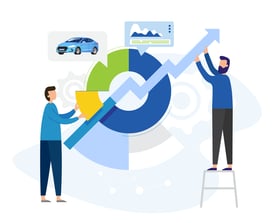Banking has changed over the years, but the changes that occurred over the last year are like nothing financial institutions have seen before. Now in 2021, banks and credit unions can’t look at consumers the way they have in the past. Many more factors are at play when it comes to who can qualify for a loan, so financial institutions must consider alternative data to bring in more, higher quality loan leads.
What is Alternative Data?
 Alternative data is a term that refers to financial and other information that isn’t typically captured by credit bureaus or included in credit reports that can contribute to greater financial inclusion and interest income. This data comes in a variety of sources, including spending habits, employment history, social media, utility bills and more. In recent years, more financial institutions have been turning to alternative data to reach more and different consumers who wouldn’t qualify for a loan in the traditional way. According to a study from Aite Group, 19% of adults in the United States, which equates to more than 45 million people, do not have credit scores that lenders could use to qualify them for loans.
Alternative data is a term that refers to financial and other information that isn’t typically captured by credit bureaus or included in credit reports that can contribute to greater financial inclusion and interest income. This data comes in a variety of sources, including spending habits, employment history, social media, utility bills and more. In recent years, more financial institutions have been turning to alternative data to reach more and different consumers who wouldn’t qualify for a loan in the traditional way. According to a study from Aite Group, 19% of adults in the United States, which equates to more than 45 million people, do not have credit scores that lenders could use to qualify them for loans.
Open Lending has the data to help you say ‘yes’ to more loans! Learn more here.
In addition, more than half of these consumers have no credit history. The reasons behind the lack of credit information range from not needing to take out a loan to simply being young and not having a substantial credit history built up yet. Alternative data can help banks and credit unions serve more underbanked consumers to help them build wealth, which is beneficial for both financial institutions and consumers.
Impact of COVID
Due to the continued effects of the coronavirus pandemic, more Americans are facing increasing financial hardship, which in turn has created another challenge for consumers looking to get a loan. Many do not have the income they once had and have fallen behind on various payments, which may cause their credit scores to decline. According to a CUInsight article sighting Experian’s State of Alternative Credit Data report, three out of four consumers believe they are a better borrower than their credit score represents. The report also found that a majority of consumers would prefer to have alternative credit data sources to be a part of the evaluation of their credit history. Now more than ever, consumers are going to be turning to their financial institutions for help, so banks and credit unions must adjust how they do business to continue serving their customers and members.
Want to learn more about our Lenders Protection™ scoring for auto loans? Contact Open Lending today!
As the economy moves forward, banks and credit unions must not be afraid to consider alternative data for a more wholistic picture of consumers – they’re far more than a credit score. Consumers with thin or no credit files deserve the chance to apply for the loans they need to get to work, carpool their children around and build wealth for their futures.